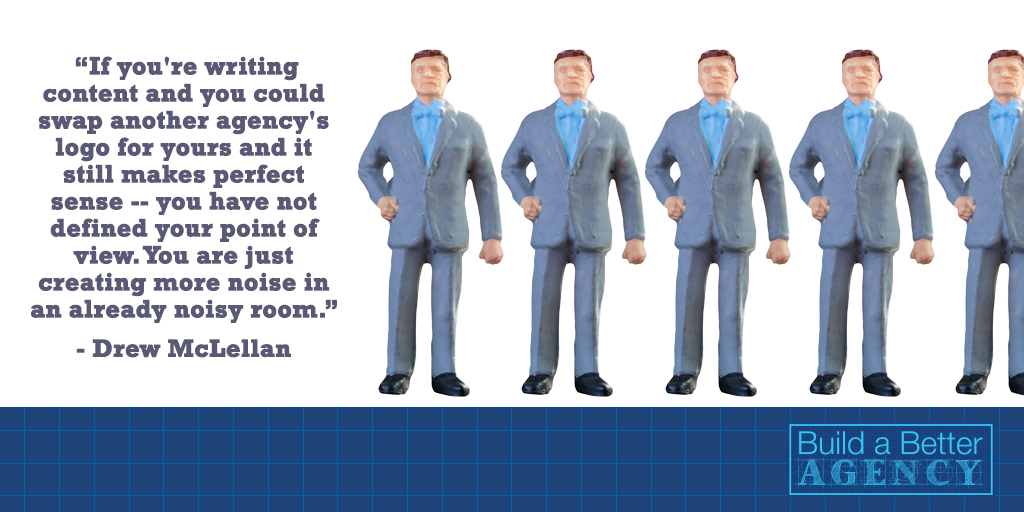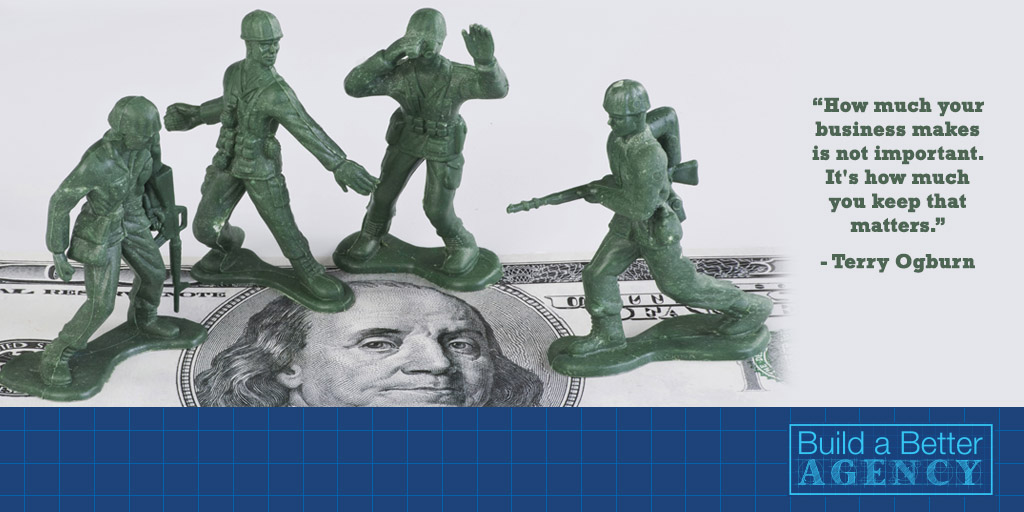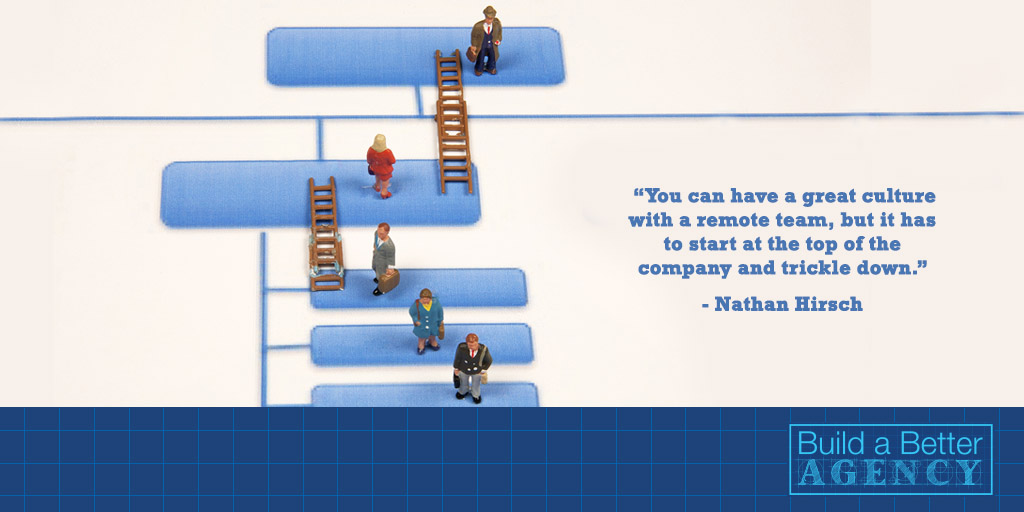Have you ever walked around Times Square? I was in New York City last week, and if you’ve ever been here before, you know it’s crazy. With all the lights, the billboards, the chaos, the signage, and the people dancing and handing out flyers – it’s just sensory overload.
The eight blocks or so radius that makes up Times Square is a study in advertising and in messaging, sort of both from an old school and new school perspective.
It made me think about one of the realities in both life in general but certainly in our life in the marketing and agency business, and that is that there is no such thing as a constant. Even the most constant of constants, like out-of-home advertising, keep changing and evolving over time. The truth of the matter is, for all of us, no matter what channel we display our message on, no matter where we are talking about the work we do and the kind of clients we serve, the channel is changing.
So if you’ve got a robust Facebook page for your agency, that’s awesome, but you know that in five years, it’s going to be something different. If you are writing incredible blog content, or you’re producing a podcast, whatever it may be, there may be remnants of what we’re doing today around in five years, but the odds are that it’s going to look different, just like these outdoor boards here on Broadway look very different than they did back in the ’40s and the ’50s.
The other thing I noticed was I was watching the messaging for the plays and the restaurants and the souvenir shops, all of them, they all look and sound the same. We all face that problem too. I think one of the biggest challenges for agencies is how do you not look like everybody else? How do you differentiate yourself? We’re great at doing this for clients, but when it comes to doing it for ourselves, we really, really struggle.
This was actually a big part of the conversation that we had in the Creating Content That Creates Revenue Workshop back in January. We started day one by talking about how the reality for all of us is that the channels keep changing and so our presence in a channel isn’t enough to differentiate us. We have to have something that makes us stand out.
We talked a lot about having a unique point of view and about really understanding what your agency was all about. Where do you plant that flag? How do you plant that flag in firm ground so that, no matter what changes, that belief is rock solid? It needs to be so firmly anchored in the ground that you know it’s not going to be blown away by whatever fad or change is coming down the pike.
And that’s what we’re going to talk about today. For agencies, we all have to be able to define that for our prospects and clients. Why us? Why us over somebody else?

What you’ll learn about in this episode:
- Staying on top of the ever-changing channels for distributing our messages
- The struggle agencies face in differentiating themselves
- Planting the flag of your unique POV so firmly that you don’t feel tempted to change away from what’s important to you when a new fad comes around
- Why you can’t afford to compete on price or proximity
- Your unique POV: what you know to be true that you talk to clients about all the time
- Figuring out what your best, most profitable clients have in common, even if it’s not an industry (and it often isn’t!)
- Why you should have three different niches
- How your unique POV combined with your niche industry knowledge makes you look and sound different from your competitors
- Building your website to show off your POV
- Infusing your POV into every piece of content you create
- A litmus test for figuring out if you’ve defined your POV
- How your POV attracts the right prospects and repels the wrong ones
Drew McLellan is the CEO at Agency Management Institute. He has also owned and operated his own agency since 1995 and is still actively running the agency today. Drew’s unique vantage point as being both an agency owner and working with 250+ small- to mid-size agencies throughout the year gives him a unique perspective on running an agency today.
AMI works with agency owners by:
- Leading agency owner peer groups
- Offering workshops for owners and their leadership teams
- Offering AE bootcamps
- Conducting individual agency owner coaching
- Doing on-site consulting
- Offering online courses in agency new business and account service
Because he works with those 250+ agencies every year — Drew has the unique opportunity to see the patterns and the habits (both good and bad) that happen over and over again. He has also written two books and been featured in The New York Times, Forbes, Entrepreneur Magazine, and Fortune Small Business. The Wall Street Journal called his blog “One of 10 blogs every entrepreneur should read.”
Ways to contact Drew McLellan:
We’re proud to announce that Hubspot is now the presenting sponsor of the Build A Better Agency podcast! Many thanks to them for their support!
I don’t know about you, but I never feel quite caught up. Thanks to my high tech Post It Note strategy (Every night I list the 3 things, and no more, I must get done the next day and put it on my laptop) I get the most critical things done but there’s always more to do.
What saves my bacon every day is that I have a superb team around me and they have systems and processes that allow them to work miracles and keep me on the straight and narrow. Like most agency owners, I have a short attention span and it’s easy for me to get distracted. Our systems pull me back to center.
Every business is made up of processes and systems, whether you have them documented or not. If your systems are informal or tribal, then odds are you and your team aren’t being as efficient or effective as you could be. You are literally trying to shove more work into a system that is simply too small.
That’s where my podcast guest, Terry Ogburn comes in. He works with entrepreneurs and their teams to create repeatable success through a system he developed through his own experience and the teachings of some of his favorite business books.
Terry Ogburn is the owner and Lead Business Coach of Ogburn’s Business Solutions. His proprietary coaching system and personal devotion to the development of others has contributed to the success of hundreds of small to large business ventures.
Terry began his business career in 1979 when he invested his last $118.42 to start an air conditioning service business. At that time, he had no car or truck, but he did have the knowledge and ability to build relationships. By 1983, he was a top 5 nominee for Small Businessman of the Year. In 1985, successful in his business and recognized as a leader in the business community, he began to mentor other small business owners.

What you’ll learn about in this episode:
- How the absence of good, repeatable systems keeps a business from growing
- Terry’s eight steps of business development that can be applied to every business
- Why you need job descriptions for every process inside your agency (and why each description doesn’t need to equal a full time employee)
- Removing your ego from your business
- What numbers agency owners need to look at, even if you don’t like numbers
- Protecting your bottom line by passing costs on to your customers
- How to carve out the time to work on your business when you are busy working in the business
- Creating a business development plan
Ways to contact Terry Ogburn:
- Website: www.terryogburn.com
We’re proud to announce that Hubspot is now the presenting sponsor of the Build A Better Agency podcast! Many thanks to them for their support!
It doesn’t matter if I’m wearing my agency owner hat or my AMI hat, branding is one of the topics that I always love to talk about. It's one of the few things in our world that has stayed consistent. It's very difficult today to survive and thrive if you are indistinguishable from your competitors. I know many of you spend a lot of time and energy developing brands for your clients but struggle when it comes to articulating your own brand in a way that is easy to grasp and actually is distinct.
When I think about brand, Derrick Daye, one of the preeminent thought leaders in branding for the last ten years or more comes to mind. You may be familiar with Derrick; in 2006 he launched a website called Branding Strategy Insider. Back in the day it was a blog about branding, and today, it still functions that way, but for many people, it’s a branding bible of sorts. Derrick and his team use real examples and case studies to teach the art and science of brand.
It was also the launching pad for Derrick and his company, The Blake Project. It's where they launch research around branding, and dissect the best brands and what they're doing. It's a great resource for agencies and client side professionals to learn about cutting-edge thinking when it comes to branding.
My conversation with Derrick was all about what he’s learned about defining and building brands like the White House Press Corps, Coca-Cola, and the National Parks of New York Harbor, when they were trying to re-think the Statue of Liberty and how it could continue to be an icon for tourists and for all Americans in NYC and throughout the country.
We got into methodologies, branding clients, getting back into the C-Suite and much more. I think you’re going to find yourself taking notes.
Before Derrick launched The Blake Project, he spent about 20 years in advertising. He worked for Saatchi & Saatchi and several other agencies and then decided that he wanted to change his career a little bit and he wanted to go on the consulting side of the business.
Since then, Derrick has been working in many countries across the world, working with national brands. He has worked with everyone from He's done some really interesting work.
Today he spends a lot of time helping agencies to figure out how to articulate their own brand and how they can work with clients to put together the strategy behind a client's brand.

What you’ll learn about in this episode:
- Derrick’s work helping brands figure out their unique value in their own marketplaces
- How brand consultancies (like The Blake Project) do strategic work that define the brand and then hand it off to brand agencies who take that strategic work and bring it to life
- Why you’ll never be able to differentiate your agency with creative, people, process, methodology, global network
- How to rely on your relationship skills to develop new business
- Why your agency’s brand is all about your distinct POV and why you need to focus on the customers that love that POV, not the customers that are the easiest sale
- The three things brands need to lead today
- Why consultancies have better access to CEOs than agencies do and how agencies can get into the C-Suite conversation
- Turning prospects into clients by showcasing creative that had a great ROI rather than touting awards
- Figuring out what a brand is fighting against and making sure that fight aligns with their goals
- Derrick’s Un-Conference which is built on the idea that people learn better in small groups and groups marketers up in teams for “competitive learning”
Ways to contact Derrick Daye:
- Website: www.brandingstrategyinsider.com
- Website: www.theblakeproject.com
- Twitter: @DerrickDaye
- LinkedIn: www.linkedin.com/in/theblakeproject
We’re proud to announce that Hubspot is now the presenting sponsor of the Build A Better Agency podcast! Many thanks to them for their support!
One of the most common challenges agencies of all sizes are facing right now is the finding the right people to add to the team. Client budgets and programs are growing, new business is getting a little easier and so everything should be rosey. But when you don’t have the right team to get the work done – it’s frustrating and frightening.
10-15 years ago the prevailing attitude was that agencies needed everyone under one roof. After all the work is so collaborative. But when the recession hit and people had to reduce fixed expenses to survive, many agencies who swore they would never use freelancers or hire someone virtual crossed over and did just that.
That’s why I was so interested in talking to Nathan Hirsch, the co-founder and CEO of FreeeUp.com, the hands-on hiring marketplace connecting hundreds of online business owners with reliable, pre-vetted remote workers. Nathan can also be found on leading podcasts, such as Entrepreneur on Fire and Eventual Millionaire, speaking about online hiring tactics.
If you listen with an open mind and a willingness to consider something different – I think you might get some interesting ideas about your own talent pool.

What you’ll learn about in this episode:
- Remote workers give business owners an opportunity to level up their talent at a cheaper cost than traditional employees
- The advantages freelancers bring to agencies
- The idea of creating your own marketplace with your freelance pool so they compete with each other and always deliver their best work
- How the freelance business is changing and freelancers have their own team working for them
- Why Nathan believes you should pay freelancers on an hourly model
- How Nathan’s company Freeeup helps its freelancers work with agencies so everyone wins
- Minimizing risk when working with freelancers and what Freeeup does to make its freelancers less risky than other freelancers
- Structuring interviews to weed out the wrong freelancers before you start working together
- Tools to work more effectively with freelancers and virtual employees
- The pros and cons of having your employees work remotely
- Creating a feeling of collaboration and teamwork when your team doesn’t see each other regularly
- Why allowing an in-office employee to go virtual rarely ever works
- The importance of diversifying when you’re hiring
Ways to contact Nathan Hirsch:
- Website: freeeup.com
- Facebook: www.facebook.com/freeeupcom
- Twitter: @freeeup
- Instagram: @freeeup_
- Email: nathan@freeeup.com
We’re proud to announce that Hubspot is now the presenting sponsor of the Build A Better Agency podcast! Many thanks to them for their support!